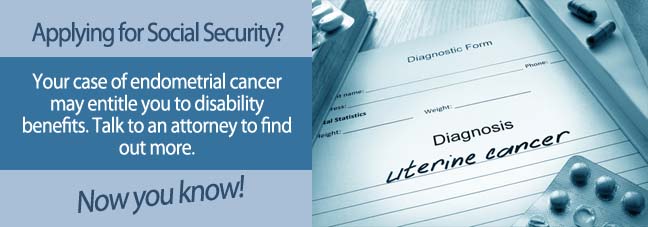Uterine or endometrial cancer can qualify for disability benefits, though the Social Security Administration (SSA) only automatically approves applications filed for the most advanced cases.
This is because the SSA’s programs are designed for individuals with long term or terminal conditions. As a result, the qualification requirements are strict, but some people do get benefits, even when endometrial cancer is “cured” or successfully treated.
Contacting an attorney will greatly increase your chances of receiving disability benefits. You will have someone on your side that can help you navigate this complex process and fight on your behalf.
Do You Meet the Severity Level Requirements?
To receive benefits, the SSA requires that you have a severe impairment that prevents “gainful activity.” This is their way of saying that your endometrial cancer must stop you from working and earning a living.
Treatment for advanced uterine cancer often requires a hysterectomy or removal of the uterus and sometimes other organs, lymph nodes, and tissues. Radical surgery like this comes with a multitude of potential complications, any of which can leave you with long-term or permanent physical limitations.
Anti-cancer therapies, like chemotherapy and radiation, come with their own set of complications that take a toll on physical and mental functioning.
Lasting effects of the illness and the required treatments can stop you from performing jobs in which manual labor is essential, like retail positions, logistics, housekeeping and maintenance, manufacturing, or childcare. Often though, you must also be unable to work in any office or other sedentary job.
This means showing you have other limitations, like persistent fatigue, digestive issues that require frequent or unpredictable bathroom breaks, or difficulty concentrating and completing tasks, to name just a few.

Can You Qualify Medically?
The SSA reviews disabilities against standard listings in its Blue Book manual, and meeting a listing means you “automatically” medically qualify. The listing that covers endometrial cancer appears in 13.23A or "Cancers of the Female Genital Tract, Uterus (corpus)" and requires that your cancer has returned after initial treatment or has spread to other organs or to nearby or distant lymph nodes.
If your cancer went into remission after treatment or was entirely removed through surgical procedures, then you may not automatically qualify, but you may still be eligible. Instead of qualifying through the Blue Book though, you’ll have to show you have other impairments that stop you from working, like those caused by residual effects of your treatments.
Whether you meet the listing or must go through additional functional limitation reviews, your medical records are crucial. You’ll want to ensure the SSA has access to records like biopsy and pathology reports, showing the diagnosis of your cancer, and imaging scans that document the grade and stage of the disease.
Surgical and other treatment records are important as well, as are doctors’ notes from physical exams that help establish long-term or permanent residual effects of treatment.
Preparing for Your Application
Before starting your application, you’ll want to gather as many of the necessary details and pieces of documentation as possible. Old pay stubs, tax returns, and bank statements give you solid financial information for your application.
Old job descriptions, medical bills, and other records will give you the former job duties, contact information, and other details the SSA asks for when you file a claim for disability.
Although endometrial cancer can sometimes “automatically” qualify for benefits, you’ll still want to seek input from your doctor and possibly a disability attorney or advocate before you start your application. These professionals can help you understand eligibility and medical evidence requirements, how to go through the application process, and what your hearing will entail.